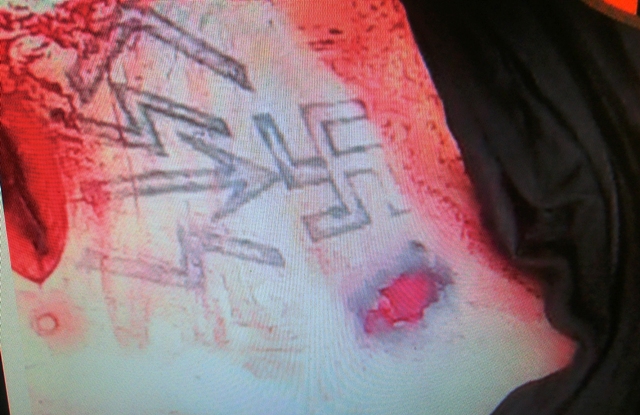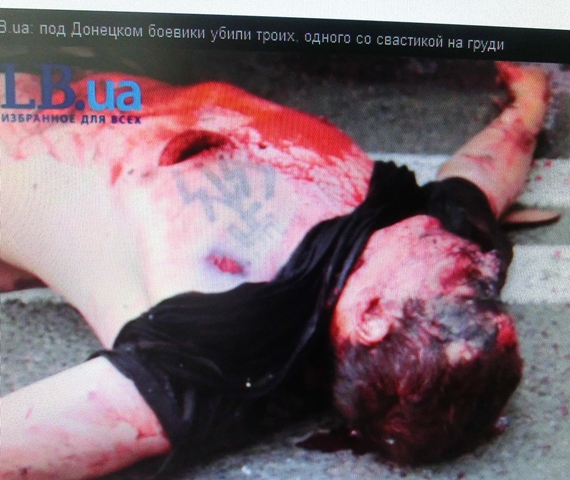Klaus Hart Brasilientexte
Aktuelle Berichte aus Brasilien – Politik, Kultur und Naturschutz
„Russian journalists being banned entry to Ukraine to cover presidential election“. Werden sich jetzt Merkel, Steinmeier, Gauck etc. bei den Marionetten in Kiew heftig für die Pressefreiheit einsetzen? Warten auf Merkel-und Steinmeier-Reaktionen zu Einsatz des faschistischen Rechten Sektors als Wahlhelfer am Sonntag.
Russian journalists being banned entry to Ukraine to cover presidential election
Published time: May 23, 2014 14:15 Edited time: May 23, 2014 18:22

Reuters / Albert Gea
Trends
Tags
Accident, Election, Human rights, Mass media, Russia, Ukraine
A range of Russian news journalists from different outlets, including RT’s Spanish and Arabic news crews, accredited to cover the upcoming presidential election in Ukraine on May 25, were denied to entry to the country without explanation.
RT Spanish cameraman Aleksandr Serichenko and his assistant, Andrey Peleshok, were refused entry at Odessa Airport, southern Ukraine. The journalists have accreditation from Ukraine’s Central Election Commission.
“Without explaining the reason for refusal, the members of [Ukrainian] border service forced the RT crew to buy return tickets at their own expense,“ said the statement from RT’s press service.
This is not the first time RT journalists have been denied entry to Ukraine. On May 20, journalists from RT Arabic were also refused entry by Ukrainian border police after arriving in Kiev to cover the election. Like the Spanish news crew, journalists from RT Arabic were also accredited by the Ukrainian Central Election Commission.
RT correspondent Anna Knishenko, and her colleagues Elderra Khaled and Konstantin Bolshakov arrived from Moscow in Kiev’s Borispol International Airport.
“At the border control they immediately took our passports. An hour later, we – one by one – were invited to a special room for an interview,” RT’s Anna Knishenko said at the time.
Following individual interviews, border guards gave the journalists papers in Ukrainian and said that they were denied entry since they could not properly explain the purpose of their visit.
On Friday, a correspondent of Echo of Moscow radio station, Ilya Azar, said on his Twitter that he was also denied entrance to Ukraine. He added that he was refused because he “couldn’t confirm the purpose of his trip.”
Azar has been reporting on the violence in eastern Ukraine for the past months.
Journalists from two more Russian TV channels were denied entry to Ukraine on Wednesday. Ren-TV crew and two crews of the All-Russia State Television and Radio Broadcasting Company (VGTRK), were banned from entering the country in Kiev’s Borisopol airport. According to the channels’ press services, the journalists had press cards and accreditation to cover the presidential elections issued by Ukraine’s Central Electoral Committee. They were denied entry under the same pretext – they allegedly could not confirm the purpose of the visit.
Media outlaws?
A whole range of Russian media outlets including Channel One, NTV, TVC and Zvezda channels have been denied entry to Ukraine headed by the coup-appointed authorities on May 15-16.
The OSCE’s representative on freedom of the media, Dunja Mijatovic, slammed the harassment of media workers in Ukraine. She confirmed that all of the abovementioned journalists were “accredited by the Ukrainian authorities for covering the presidential elections.”
Human Rights Watch spoke with RT’s Anna Knishenko, along with other Russian journalists refused entry between March and May, and condemned Kiev’s actions.
“While Ukraine has a right to control who enters its country, refusal of entry on arbitrary or discriminatory grounds such as nationality or political opinion is inconsistent with the exercise of that right under international human rights law,” HRW said.
Apart from cases of banning Russian media workers from entering Ukraine, cases of their detention and deportation by special services and law enforcement for covering the events in the east of the country have appeared.
Two Russian journalists working for LifeNews TV channel – reporter Oleg Sidyakin and cameraman Marat Saichenko – were captured by Kiev forces on May 18 near the eastern city of Kramatorsk. Following their detention a video appeared showing Ukrainian troops forcing the handcuffed journalists to get down on their knees under gunpoint.

Journalists Oleg Sidyakin and Marat Saichenko. Image from www.lifenews.ru
The detained journalists are being investigated on charges of “aiding the terrorist groups,” deputy secretary of Ukraine’s National Security and Defense Council (SNBO) wrote on her Facebook page.
Russia’s envoy to the OSCE said that Ukrainian authorities denied a special observation mission to visit the detained Russian journalists.
UN observers cannot find out the location of the detained journalists, said UN Secretary General spokesperson Stephane Dujarric on Friday adding that they are seeking access for lawyers to the detained.
The journalists’ lawyer Tatiana Khokhlova told RIA Novosti on Friday that Ukraine’s Security Council still has not given an official response as to where the detained journalists are being held. She added that lawyers are not permitted to see them. There are reports that Ukrainian troops have fired at people with cameras, even at those wearing blue press vests.
On May 9, a Ruptly cameraman was wounded during an armed assault by Kiev’s army on Mariupol police HQ. In spite of his bulletproof vest, the cameraman sustained a serious injury to the abdomen. A medical jet sent to retrieve him was allowed to land in Donetsk only after three days of negotiations.
On May 20, RT contributor and UK national Graham Phillips was detained by Kiev military forces at a checkpoint in the city of Mariupol. He was transferred to army barracks Zaporozhye “at gunpoint” and interrogated by Ukrainian security forces, but released after almost 36 hours of detention.

“Wahlhelfer” Rechter Sektor: http://www.hart-brasilientexte.de/2014/05/23/ukraine-2014-deutsche-medien-schweigen-offenbar-weiterhin-zur-brisanten-wahlhelfer-rolle-des-faschistischen-rechten-sektors-bei-urnengang-am-sonntag-weiter-warten-auf-proteste-reaktionen-aus-be/
Ukraine 2014. Hakenkreuz und SS-Rune auf die Brust tätowiert bei Nationalgardisten des faschistischen Rechten Sektors, laut Video des ukrainischen Nachrichtenmediums “LB.UA”. Rechter Sektor bei der Wahlfarce des Sonntags als Wahlhelfer tätig. **
tags: scholl-latour und desinformation, ukraine-kalter krieg 2014

Ausriß.
Zu den Terrorkommandos, die die faschistische Kiewer Marionettenregierung gegen die antinazistischen Regimegegner der Ostukraine losschickt, gehören gemäß Video allen Ernstes Männer mit eintätowiertem Hakenkreuz und SS-Rune auf der Brust. Die Tätowierungen waren bei einem im Gefecht getöteten Mann der Nationalgarde entdeckt worden, die von der Kiewer Marionettenregierung aus Mitgliedern des Rechten Sektors gebildet worden war. Tätowierungen dieser Art, nicht neu, lassen interessante Schlüsse zu – hochrangige Politiker in Berlin, Brüssel, Washington sehen bisher indessen keinerlei Grund für Kritik…

Ausriß.
Große deutsche TV-Sender verwenden zwar Ausschnitte aus den Videoaufnahmen, zeigen indessen nicht den Toten mit den aufschlußreichen Tätowierungen.
Rechter Sektor und deutsche Medien: http://www.hart-brasilientexte.de/2014/04/30/ukraine-2014-neuester-manipulationstrick-rechtsextremisten-demonstrieren-in-kiew-offen-mit-in-deutschland-verbotenen-nazisymbolen-wie-der-wolfsangel-doch-deutsche-medien-bezeichnen-die-neonazis-le/
Angela Merkel – Zeitdokument: http://www.hart-brasilientexte.de/2014/04/16/ukraine-2014-und-nato-mobilmachung-an-ruslands-grenze-zeitdokument-merkel-verteidigt-irak-kriegfaz-rd15-millionen-kriegstote/
« Die BRIC-Staaten Rußland und Brasilien. Das WM-Austragungsland fiel bei Wettbewerbsfähigkeit stark zurück, während Rußland sich deutlich verbesserte. – Ukraine 2014: „Several houses destroyed in Sloviansk hit by massive artillery strikes“. Was in deutschen Medien fehlt… Weiter warten auf Proteste von Merkel, Steinmeier, Gauck etc. gegen Ermordung ostukrainischer Zivilisten durch Terrorkommandos Kiews. Wer tötete Zivilisten in Krasnoarmeisk – die „Separatisten“(Tagesthemen-Version) oder Kiewer Terrorkommandos(Faktenlage)? »
Keine Kommentare
Noch keine Kommentare
Die Kommentarfunktion ist zur Zeit leider deaktiviert.
NEU: Fotoserie Gesichter Brasiliens
Links zum Thema Ukraine
Fotostrecken Wasserfälle Iguacu und Karneval 2008
interessante Links
Seiten
Ressorts
- Kultur (6.975)
- Naturschutz (1.101)
- Politik (12.729)
Suchen
RSS-Feeds
Verwaltung


